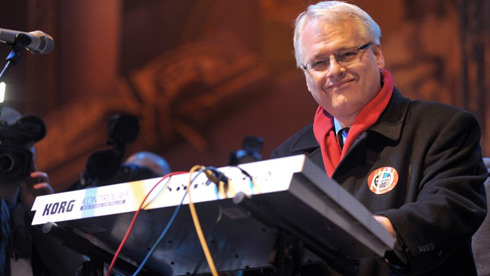A shining, white piano sits in the foyer during a very official interview of the master of the premises. CDs change hands. The scene could be taking place in any national opera house if it weren't for the bomb detectors that slowly scan the undersides of cars at the Zagreb presidential palace. The man who lives here is a musician. He is also the President of Croatia
It is not insulting to the country to note the modest amount of space it takes up on the world map. It is a Balkan confetti of 4.5 million inhabitants, thrust between the Mediterranean Sea and Central Europe. At the forefront of the dismemberment of the former Yugoslavia, Croatia will be in the news in 2013 when it joins the European Union on July 1. However, this event is unlikely to grab the headlines.
A former harmony teacher
Yet Croatia is eligible for a catchy slogan: the country where music rules. There are music schools in every town and village. Folk groups and choirs resound across the plains from Slavonia to the Dalmatian coast. As for the national radio and television building in Zagreb, it houses four permanent musical ensembles: a symphonic orchestra, a choir, a jazz orchestra and a traditional music group.
Furthermore, Croatia is the only country in the world in which the president is also a composer. Not an amateur saxophone player such as Bill Clinton, or a week-end accordionist in the manner of [former French President] Valéry Giscard d'Estaing. No, this one is real; in the tradition of King David and Frederick the Great or the grand Ignace Pacerewski, pianist, composer and president of Poland after WWI. "The only president capable of detecting an incorrect doubling of the bass note in an inverted tonic chord," it is jokingly said at the Zagreb Academy of Music where Ivo Josipovic was still teaching harmony three years ago.
How did he get where he is now? Settled in his armchair, wearing a blue suit and white shirt, the president smiles. "I've always done several things at once," he explains. As a child it was school and the conservatory, a double curriculum typical of the elite of the time. When it came time to go to university, young Ivo dreamt of physics. But it was out of the question for him to quit music. "My father was a lawyer. In the library, I found a book on Roman law that fascinated me. That was fortunate: in law there were few course hours...," he says. As a young man he was bright, quick and serious. "Not a revolutionary," insists his friend Berislav Sipus, a composer and the vice-minister of culture. "His compositions, while drawing on different worlds, were rather classical, but always successful, and balanced. Mostly, I asked myself how he did everything at once," he adds.
The country's most popular politician
During the 1980s, while composing about 20 works, he wrote his law thesis, began teaching and headed the composers' union. This was a key position when war broke out in 1991 in what was then Yugoslavia. In Zagreb, as well as in Belgrade, his role as a moderator was praised. "Collecting Croatian royalty payments blocked in Belgrade and finding a legal solution that satisfied everyone was a genuine exploit," says Berislav Sipus.
He then went to The Hague to battle for Croatian interests as his county's representative at the International Criminal Tribunal. At the same time, he pursued another career as an academic. During the 2000s, he added the direction of the prestigious Music Biennale Zagreb, a bi-annual contemporary music festival, to his workload and officially entered politics as a member of the Social Democrat Party.
Elected to parliament in 2003, he was selected as his party's presidential candidate in 2009. He was derided for his lack of charisma. "People were tired of corrupt jokers," says Niksa Gligo, another composer and Josipović's friend of 30 years. "He was reassuring," he adds. Supported by civil society and a myriad of artists, his campaign against corruption and in favour of regional reconciliation hit the right chord. He was elected in January 2010 with 60 per cent of the vote. Nearly three years later he remains the country's most popular politician.
The only promise he will not keep…
What remains of the composer in the man perched in his presidential palace? Perhaps a conviction that "culture can help us get through the crisis" and that "it must be at the heart of the European project". There is a concern, therefore, to sustain the arts budget, as much as possible, in times of recession. And a strong will to keep the country in harmony.
Harmony is something the musician misses at times. He only fingers his piano on Sundays "and even then...". He has not composed anything in four years. He dreams of the post-presidential period and of the opera commissioned by the Biennale in 2010, which he officially accepted before setting it aside four months later. The subject still gives him the chills: John Lennon "and especially his killer, Mark David Chapman". His eyes drop down from the ceiling and he says, "It is the only promise I will not keep as president. I will leave that to the composer."
Was this article useful? If so we are delighted!
It is freely available because we believe that the right to free and independent information is essential for democracy. But this right is not guaranteed forever, and independence comes at a cost. We need your support in order to continue publishing independent, multilingual news for all Europeans.
Discover our subscription offers and their exclusive benefits and become a member of our community now!












